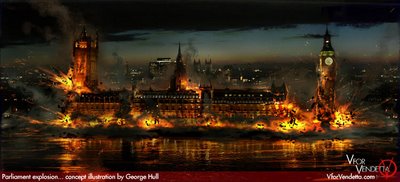 My friend Gareth passed me J Hoberman's Village Voice review of V for Vendetta, which argues:
My friend Gareth passed me J Hoberman's Village Voice review of V for Vendetta, which argues:If The Matrix betrayed the Wachowskis' acquaintance with Jean Baudrillard, V for Vendetta suggests they've been perusing political philosopher Antonio Negri—both the old ultra-left Negri of Domination and Sabotage and the new Michael Hardt–collaborating Negri of Empire and Multitude. (The latter book even name-dropped The Matrix as an example of how Empire feeds on the creative "social productivity" of the ruled.) V's dictum that "people shouldn't be afraid of their government, the government should be afraid of its people"—is a Cracker Jack box restatement of Negri and Hardt's notion of democracy for all. And the theorists would surely approve of V as the antithesis of a Leninist revolutionary elite.Well, I'm not quite so sure about that. V, for instance, is hardly "the antithesis of a Leninist revolutionary elite." If anything, his tactics are a prime example of anarchist propaganda of the deed: sowing the seed of disorder through spectacular but still fundamentally individual assaults on the symbols of power.
And yes, there's something interesting about the crowds that in the final scenes converge on the Houses of Parliament, and overwhelm the security forces. But they aren't "mysteriously networked" as Hoberman goes on to suggest; they have been interpellated by our hero V's appropriation of the airwaves twelve months previously--the same V who personally, it seems, sent out the masks that they have donned as uniform as much as identification with his cause.
V has more in common with Don Bruno Aragón de Peralta, of José María Arguedas's Todas las sangres (All the Bloods). Don Bruno is a Catholic fanatic who goes on a purifying rampage at the novel's climax, an all-out assault both on the cruelties and perversions of feudalism, and on the soullessness and commodification of capitalism. (I discuss this at further length here.) And Guy Fawkes, V's model in insurgency, was likewise a Catholic whose violence was intended to be restorative more than revolutionary.
Moreover, Bruno and V alike act out of ressentiment and revenge, to expunge a founding trauma or stain that they bear (V very literally) upon their bodies. So although in the film Evey suggests at the end that V is a modern-day everyman--he is her father, her mother, her brother, her lover...--in fact the plot depends upon the (only half-explained) idiosyncrasy of V's personal immune system, in that he is the sole survivor of a gruesome programme of biological testing. So, in the final scene, V is singular and the crowd that passively watch his long-planned spectacle are common; but the multitude should in fact combine singularity and commonality, rather than separating them out in this way.
Which is not to say that the multitude is not an ambivalent category, too. And there is something invigorating about seeing Parliament blown up.

No comments:
Post a Comment